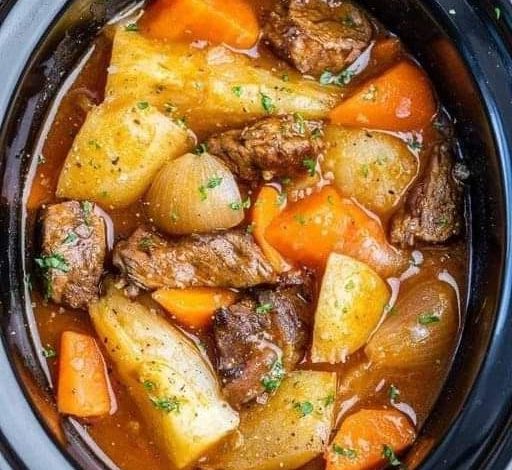
ADVERTISEMENT
Beef Stew: A Classic Comfort Food
When it comes to comfort food, few dishes are as universally loved as Beef Stew. This hearty, nourishing meal is a perfect blend of tender beef, root vegetables, and rich broth, simmered together to create a dish that warms both the body and soul.
The Essence of Beef Stew
Beef stew is a slow-cooked dish that features chunks of beef, usually from tougher cuts like chuck or brisket, which become tender and flavorful after hours of simmering. The beef is cooked alongside a variety of vegetables, most commonly potatoes, carrots, and onions, in a savory broth seasoned with herbs and spices. The long, slow cooking process allows the flavors to meld together, creating a deeply satisfying meal.
Key Ingredients
The beauty of beef stew lies in its simplicity and flexibility. The core ingredients typically include:
- Beef: Chuck roast, brisket, or round cuts are ideal as they become tender with slow cooking. The meat is usually browned first to develop a deeper flavor.
- Vegetables: Potatoes, carrots, and onions are traditional choices, but you can also add parsnips, turnips, or celery for added flavor and nutrition.
- Broth: Beef broth or stock forms the base of the stew, providing a rich, savory foundation. Some recipes also incorporate red wine or tomato paste for additional depth.
- Herbs and Spices: Common seasonings include bay leaves, thyme, rosemary, and garlic, which infuse the stew with aromatic flavors.
- Thickening Agent: Flour, cornstarch, or even mashed potatoes can be used to thicken the stew to your desired consistency.
Preparation Process
- Browning the Beef: Start by cutting the beef into bite-sized chunks and seasoning with salt and pepper. Brown the beef in a hot skillet or Dutch oven until all sides are nicely seared. This step is crucial for building flavor.
- Adding Vegetables: Once the beef is browned, add chopped onions, garlic, and any other vegetables to the pot. Sauté until the onions are softened.
- Simmering: Pour in the beef broth and any additional liquids like wine or tomato paste. Add the browned beef back to the pot, along with herbs and spices. Bring the mixture to a boil, then reduce the heat to a simmer.
- Slow Cooking: Cover the pot and let the stew cook slowly over low heat for several hours. This long, slow cooking process is what transforms the tough beef into tender, melt-in-your-mouth pieces. Stir occasionally and adjust seasoning as needed.
- Final Touches: Towards the end of cooking, taste the stew and adjust the seasoning. If you prefer a thicker stew, you can mix a little flour or cornstarch with water and stir it into the pot, cooking until the stew thickens.
Serving Suggestions
Beef stew is a versatile dish that can be served in various ways:
- With Bread: Serve with crusty bread or rolls to soak up the delicious broth.
- Over Rice or Noodles: For a more filling meal, serve the stew over rice, egg noodles, or mashed potatoes.
- On Its Own: A bowl of beef stew is hearty enough to stand alone, especially on a cold day.
Variations and Tips
- Irish Beef Stew: Incorporate Guinness beer into the broth for a rich, slightly bitter flavor, often paired with lamb instead of beef.
- French Boeuf Bourguignon: Add red wine and mushrooms for a more elegant twist on traditional beef stew.
- Vegetable Variations: Add or substitute vegetables like mushrooms, peas, or green beans to customize the stew to your liking.
Conclusion
Beef stew is a dish that has stood the test of time, loved for its rich flavors, simplicity, and the comfort it brings to those who enjoy it. Whether you’re making a traditional version or adding your own twist, beef stew is a meal that is sure to satisfy and warm you from the inside out. It’s the perfect dish for a cozy evening at home, offering a taste of tradition with every bite.
ADVERTISEMENT
This article captures the essence of beef stew, discussing its ingredients, preparation, and why it continues to be a beloved comfort food across the globe.




